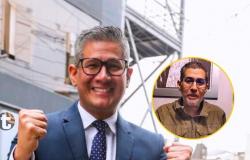María Rosa Lojo, fiction writer and literature researcher, receives a new distinction. This time, for his narrative book What they did therepublished in 2023 by Corregidor, one of the few Argentine family publishers that has managed to survive the vicissitudes of our country’s economy for more than half a century.
On May 10 at 4 p.m., Lojo will receive the Declaration of Legislative Interest for Communication and Culture at the stand that the Legislature of the Autonomous City of Buenos Aires will have at the Book Fair.
Your book What they did there (Argentina Key Titles 2023) will be presented by Representative Cecilia Ferrero and during the award ceremony the writers Elsa Drucaroff and Pablo de Santis will speak. The actress María Heguiz will read texts and María Rosa Lojo and Editorial Corregidor will thank her.
Lojo has received multiple distinctions both inside and outside the country.
Daughter of a Galician father and a Castilian mother, in 2020 she was incorporated as an honorary member of the Galician Language Academy. She gave her excited and exciting entrance speech to that Academy in the language of her father.
This daughter of immigrants, she studied Literature at the University of Buenos Aires, received a doctorate in Philosophy and Letters from the same university, was a principal researcher at the National Council for Scientific and Technical Research (Conicet) and continues to dazzle with her fictions.
In an interview with Osvaldo Quiroga held at last year’s Book Fair, says Lojo de What they did there: “This was a book that was made over a slow fire, in a zigzag way. I started it in 2017 with the first story, “Perfiles”, which was published in “Summer 12”. Then I came up with stories linked to characters that appear in this first story.”
And he adds: “It is not a novel, nor is it exactly a story book. Rather, it is a book of linked stories that have a certain autonomy. The surprise, for those who read it, is that they have to put it together, it is Cortazarian in this sense.”
“It can be put together, it is not a desperate search, but in that bet there is something fundamental about the book that has to do with secrecy, with the deep conviction that our lives are a secret, even for ourselves.”
“We never finish revealing our lives or the lives of those who preceded us who also appear in this book, they are stories of intertwined families, also of work ties and bonds of friendship. It has a lot of tragedy and also a lot of hope.”
A distinction that is resignified
Every distinction has an intrinsic value but in the current circumstances of the country that value acquires a meaning that is given, beyond its value itself, precisely by those circumstances.
Lojo is perhaps the paradigm of what made public education possible, which was an emblem of Argentina. Of course, she had the talent, the work capacity and the perseverance to make the most of each of the opportunities offered by this country to which her parents arrived fleeing the miseries of post-war Europe.
They were aware of the value of education as an agent of personal growth and social mobility, which is why they encouraged their daughter’s premature displays of love for knowledge.
“I think that those of us who are descendants of immigrants – says Lojo in an interview with Tiempo Argentino – carry everything that our parents could not do. That is both an incentive and a debt. I, at least, have felt it quite strongly. The vocation I genuinely have was encouraged in my home. My parents would have liked to study, but they couldn’t. Every time I have an achievement in my life, something positive, I think about them, how much they would have liked to know about it and, in some way, I dedicate it to them.”
The public education that seemed unquestionable and that was the foundation stone of the achievements of this great writer and researcher and of so many millions of people to whom, in different measures, it helped to improve their lives, today is called into question. For Javier Milei’s government, nothing, not even education, is left out of the business area.
The University of Buenos Aires, where Lojo did his undergraduate and graduate studies, is suffering an unprecedented crisis that is causing students, workers and members of social movements to join together tomorrow in a march that will undoubtedly be massive.
The CONICET of which this daughter of immigrants was a brilliant researcher is also questioned by a government that aims at the destruction of national assets. Once, the researchers of this institution had to suffer the affront of Domingo Cavallo sending them to wash the dishes.
The culture as a whole is attacked. Osvaldo Quiroga, who always did interviews from the Book Fair, as well as Cristina Mucci, today are off the air of Public Television on which all kinds of speculations are woven with the aim of obtaining an income that will not be destined for well-being of the Argentine people. In the era of communication, the only medium that reached every corner of the country is closed.
For this reason, the distinction given to Lojo has a double significance insofar as it recognizes his creative talent and intelligence and, at the same time, is a paradigmatic example of what can be achieved through public education.
Therefore, it will be doubly exciting to attend the May 10 at 4 p.m. at the Stand of the Legislature of the City of Buenos Aires at the Buenos Aires International Book Fair Aires to accompany the author.






